An Evening of Celebration of the One Nucleus Ecosystem in 2024


By Tony Jones, CEO, One Nucleus
On the evening of 21 March 2024 at No. 11 Cavendish Square in London, for the first time in its history, One Nucleus delivered an Annual Awards Dinner to recognise and celebrate the breadth and depth of excellence within the One Nucleus network.
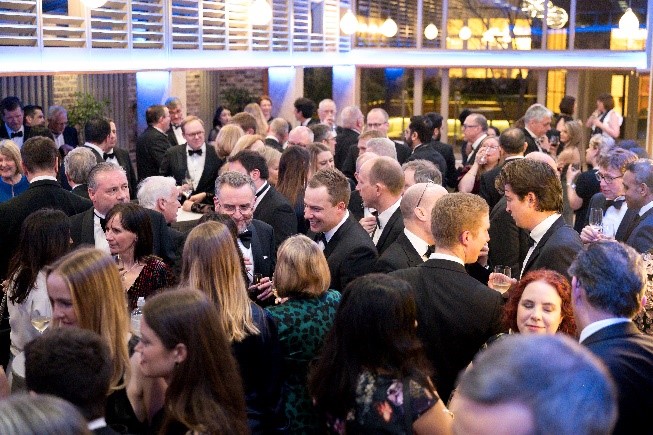

One Nucleus sees itself as a very inclusive not-for-profit membership organisation for life science companies, seeking to support all connected organisations on their journey to success irrespective of size, business model, stage of development, or geography. It is One Nucleus’s firm belief that a successful life science ecosystem that translates great science and research into improved patient outcomes requires all parts of the sector to play their part. The award categories, across which the Best Performance of the Year was sought, reflected this opinion that there is a role for everyone and that everyone has their role to play.

The MC for the evening was veteran industry commentator Mike Ward, Global Head of Life Sciences & Healthcare Thought Leadership at Clarivate, bringing his now renowned insight and humour to proceedings. Quite rightly, Mike set out how all the finalists should be considered winners given their achievements over the past year that had led them to be on the shortlist in their respective categories. Alas though there can only be one organisation in each category that walks away with the winner’s trophy…
the 2024 winners …
Stevenage Bioscience Catalyst (Facilities Provider)
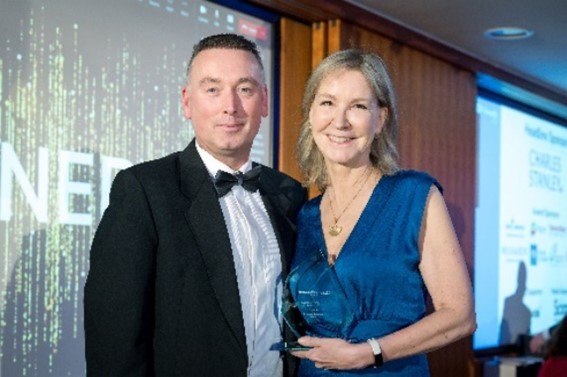
Formed through a collaboration between GlaxoSmithKline, the Department for Business, Energy and Industrial Strategy (BEIS), Wellcome and Innovate UK, development at and around Stevenage Bioscience Catalyst (SBC) has accelerated markedly of late. It has created a globally recognised cluster for therapeutic research and development that provides support for translation and commercialisation of innovative new medicines. Of particular note on their award entry, SBC provides an environment with significant open plan and meeting spaces to enhance collaboration as the industry evolves, flexible leasing terms including rolling 3-month notice periods, no up-front costs, and even a free Lab Hotel for start-ups, all of which contribute to the facility they are proud to offer. Supporting diversity and inclusion, SBC is increasing access through promoting female leadership, has achieved diversity and equality at Board level, and supports SEN pupil work placements.
Cambridge Innovation Capital (Investor)
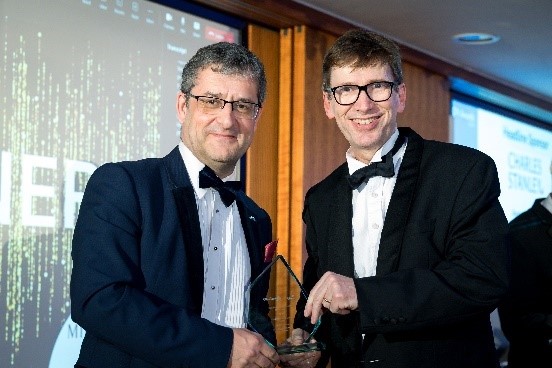
As a team, Cambridge Innovation Capital (CIC) has a passion for science and its potential to drive change. Through their expertise and position in one of the country’s most powerful science and technology ecosystems, they are able to identify and support the most promising entrepreneurs in knowledge intensive businesses and help them achieve their vision. Providing the required financial backing and expert guidance, Cambridge Innovation Capital enables the pioneers in life sciences and deep tech to create world-leading companies whose unique ideas bring financial success and global impact. Of particular note for the judges was CIC’s impressive track record of successful exits, including PetMedix and Sense Biodetection, whilst their portfolio continues to progress their pipelines with significant announcements in the past year. Delivering academic entrepreneur programmes and teaching on MSc courses, CIC looks to the future pipeline while developing their ESG Toolkit to guide their early-stage investee companies.
Medicines Discovery Catapult (Non-Profit Life Science Innovation Enabler)
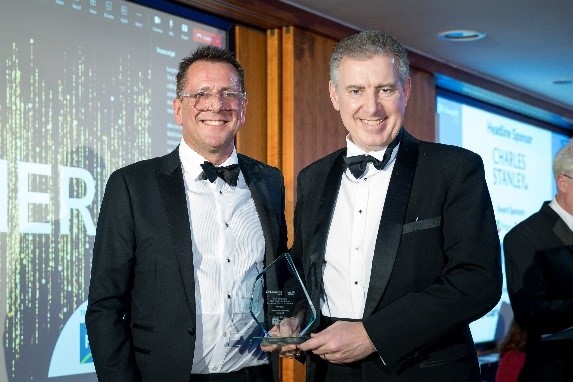
Established by Innovate UK since 2016 and operating as an independent, not-for-profit drug discovery innovation centre, the Medicines Discovery Catapult (MDC) supports drug discovery innovators by providing world-leading scientific and drug discovery expertise, state-of-the-art laboratory facilities and infrastructure, with advanced technologies and analytics. The goal is to accelerate innovation, support business growth, and help improve patient outcomes. MDC is an independent, commercially active not-for-profit company, reinvesting its revenues back into the sector to drive further growth and innovation. It is co-funded by industry and government, working with partners in the sector to de-risk inventive technologies, techniques and companies – making them adoptable and investable. Their work with UK SMEs has helped them raise over £600M and take products and services to market. Of particular note for judges on top of the overall activity above were MDC’s diseases-focussed Consortia in Cystic Fibrosis Antimicrobial Resistance and Consortium in Psychiatry.
Parkinson’s UK (Non-Profit Research Organisation)
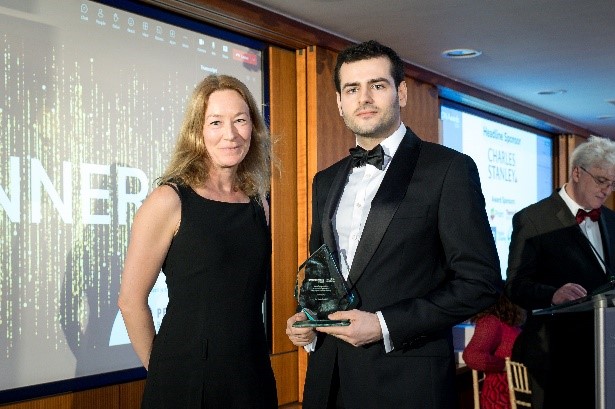
By funding the right research into the most promising treatments, Parkinson’s UK believes a cure is getting closer every day. Until that day arrives, they are there for everyone affected by Parkinson’s, signposting to support available, harnessing the community to fundraise for research, and by funding leading edge research. Of particular note for the judges this year was their Virtual Biotech seed funding model to accelerate translational research, which has funded three companies, two of which research the repurposing of drugs. Furthermore, noted was their early support of ED&I in scientific research; they launched their Race Equality in Research Programme to pioneer solutions to this very issue.
AstronauTx (Primary R&D Company)

At the forefront of a novel approach to treating neurodegenerative diseases, AstronauTx has a unique portfolio of small molecule therapeutics to restore dysregulated physiology to both improve symptoms and modify disease. Of particular note for the judges from this new biotech company is its completely novel approach to treating neurodegeneration by amplifying the brain’s normal physiology for dealing with toxic deposits such as amyloid plaques. They raised £48M from a syndicate of six in 2023 that included two specialist neuroscience investment funds, two global VCs, and two strategic Pharma investors. In addition, AstronauTx has entered into two major R&D collaborations with Saniona in Denmark and ARUK Drug Discovery Institute, UCL, respectively.
Protagoras Group (Professional Service Company)
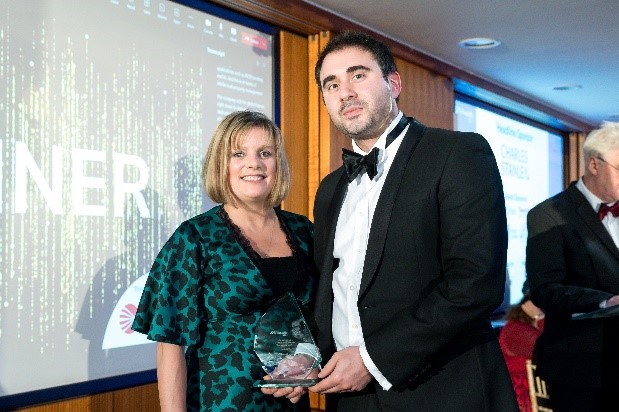
Protagoras Group, a London-based boutique life science consultancy, was founded to support clients in driving innovation throughout all aspects of their business. The company has worked with life science companies of all sizes, ranging from early-stage start-ups right through to top-ten Pharma. While the team’s experience and industry knowledge match those of other consultancies, Protagoras believes their true differentiation lies in their collaborative, client-focused approach. Of particular note for the judges was that the company had demonstrated an impressive 150% (and accelerating) year-on-year growth, is driven by an ethos of establishing long-term relationships with clients and had achieved a 98% retention rate. One client describing them as ‘the holy grail to perfect external medical strategic support’.
Abzena (R&D Service Provider)
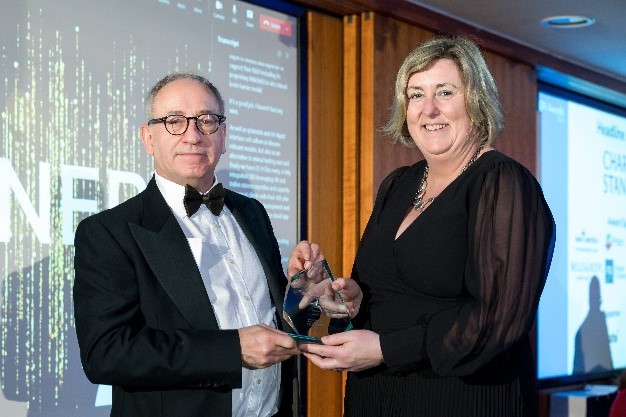
Offering contract development, screening, assessment and manufacturing services catering to the integrated early discovery of clinical and commercial biotherapeutic and bioconjugation drugs, Abzena enables the development of better treatments for patients. As a provider, the company offers its customers fully integrated and tailored, innovative solutions that make it possible to realise the full potential of their molecules. Of particular note for the judges was Abzena’s significant investment in their people, scientific expertise, and facilities, which have seen increased revenues by 250% over 5 years with clients across the UK, Europe, US and East Asia. The company has an extensive range of proprietary biologic methods and processes that informs its ‘start smart, finish fast’ approach for clients.
The Francis Crick Institute (Technology Transfer Office)

The Francis Crick Institute’s team helps connect scientists with industry colleagues, clinicians, drug discovery experts, technology experts, and investors, who can help turn discoveries in the lab into potential new treatments and technologies to benefit patients. Working with individual research groups, the team guides projects through different phases of development, providing advice, funding, and connections with external partners. The driving focus is on long-term impact rather than short-term revenue generation. Of particular note for the judges was the Translation Team’s achievements, including signing an EPSRC Prosperity Partnership with AZ in 2023 for circa £11M, executing several licences with pharma, biotech and medtech companies, as well as seeing a successful exit in the shape of Gamma Delta. With success such as the above and a growing portfolio of seed-funded proof of concept projects, the Institute secured a £50M philanthropic pledge from the Chris Banton Foundation to continue supporting translational research, encouraging entrepreneurship, and start-up company formation.
Anji Miller (Outstanding Contribution to Life Sciences)
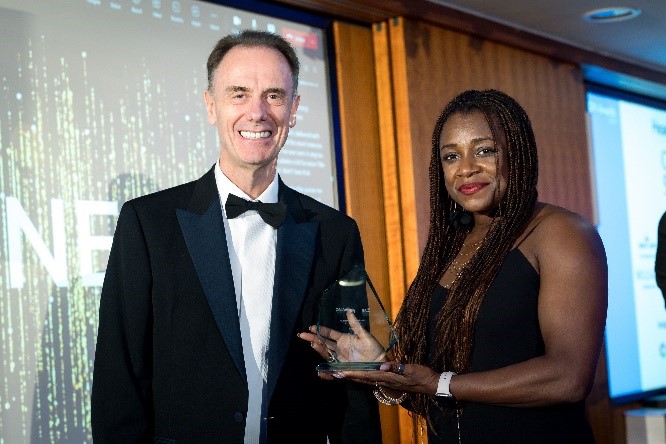
The recipient of this sponsor’s choice award is selected in recognition of the positive impacts they bring to the Life Sciences sector through their efforts. In their day job as a Senior Business Manager at LifeArc, Anji spearheads their support for academic-led gene therapy innovation, with responsibility as the overall LifeArc lead for the Innovation Hubs for Gene Therapies, the LifeArc Gene Therapy Innovation Fund, and advancing the hubs’ gene therapy skills agenda. Anji also has management responsibility for specific projects within LifeArc’s Philanthropic Fund.
With a PhD in cancer genetics from Imperial College followed by an MSc and Certificate in Intellectual Property Law from Queen Mary, University of London, Anji has become a seasoned technology transfer professional, leading the LifeArc-AUTM Technology Transfer Training Fellowship programme which plays a pivotal role in attracting and developing talented scientists into the technology transfer profession. Anji is a Board Director of AUTM, ASTP, and member of the BioIndustry Association Cell & Gene Therapy Advisory Committee. An EDI in STEM advocacy, she directs all technology transfer skills activity and translational STEM outreach programmes and is an active participant in LifeArc’s policy engagement.
The above roles, both paid and voluntary, are undertaken with authenticity, passion, energy, generosity, and professionalism that is infectious to others. Perhaps Anji is best summed up by one of the Technology Transfer Fellows they have helped guide when they said, “Anji is a unique people person with a rare combination of professional expertise, motivational skills, powerful energy, and empathy – anytime, anywhere!”

A Word of Thanks
Such evenings of celebration are only possible with the support of the sponsors, entrants, judges and attendees.
*Photographs by Simon Callaghan Photography